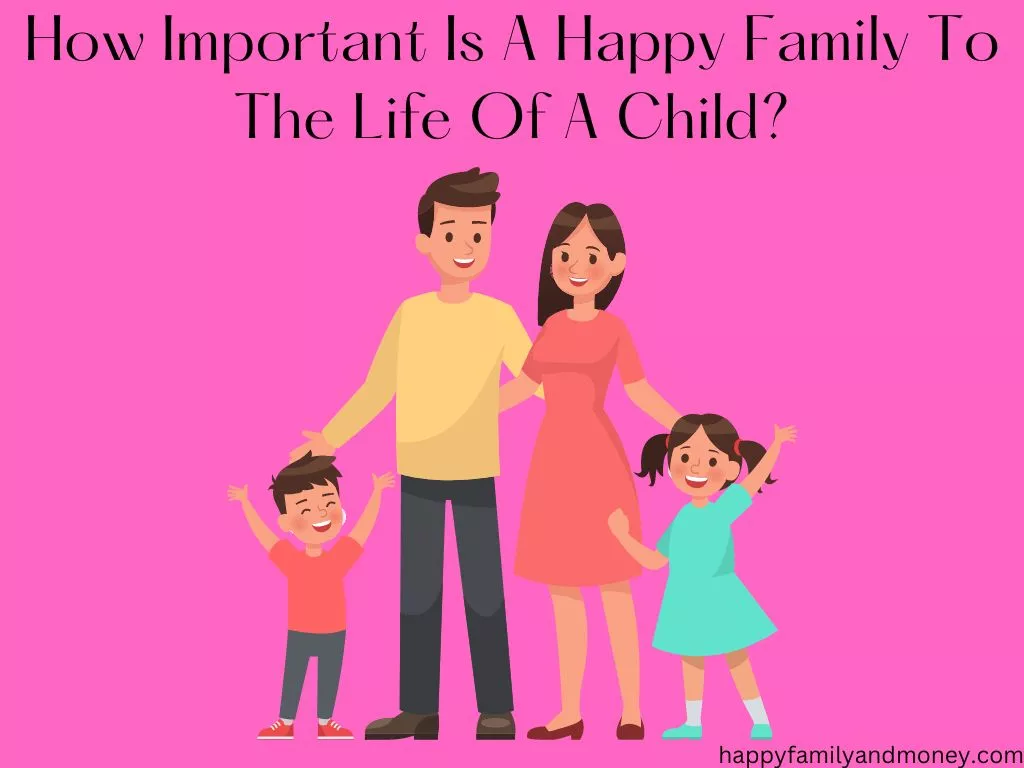Most people would say that a happy family is one of the most important things in the life of a child. A happy family is one that is able to provide a stable environment in which the child can grow and develop.
This is because a happy family is able to create a positive attitude in the child and help them learn how to cope with life’s challenges.
In this post, I will explore the importance of a happy family in everyone’s lives. Let’s get started!
15 ways a happy family is important to the life of a child
There are many reasons why a happy family is so important to the life of a child. Here are 15 of the most important reasons:

1. A happy family is able to provide a sense of security.
The presence of a happy family is one of the most important factors in the life of a child. It provides them with a sense of security and stability, which can help to boost their confidence and mood.
It can also help to widen their social circles and provide them with support when they need it.
2. A happy family is able to provide a sense of belonging.
A happy family is able to provide a sense of belonging. This is especially important for children, who need to feel like they belong somewhere in order to feel secure and happy.
When parents are able to create a strong and stable home environment for their children, it can help them develop positive self-esteem, communication skills, and problem-solving abilities.
Additionally, a happy family is often the foundation for a child’s future success. A child who feels loved and supported by his or her family is more likely to achieve success in school, find happiness in life, and maintain healthy relationships throughout adulthood.
3. A happy family is able to provide a sense of love and support.
A happy family is able to provide a sense of love and support. A child who has happy family feels loved and supported, which can help them to feel good about themselves.
This can lead to better mental health, more success in life, and increased happiness overall. In fact, research has shown that having a strong family unit is one of the most important factors in a child’s overall happiness.
4. A happy family is able to provide a sense of discipline.
Children who grow up in happy families are able to learn how to problem-solve and cope with difficult situations. This is because they have learned how to rely on their family and friends for support. A happy family is also key in providing a child with role models.
When a child sees their parents or other adults behaving responsibly, it can instill good values in them. Finally, having a happy home environment can increase the chances that a child will be successful in school and have healthy relationships later on in life.
5. A happy family is able to provide a sense of understanding.
A happy family is able to provide a sense of understanding and security for their children. This can help to prevent the child from feeling lost or alone and can help them to develop a strong relationship with their parents.
A happy family is also able to offer support during difficult times, such as when a child is going through a tough phase in their life.
6. A happy family is able to provide a sense of self-confidence.
A happy family is able to provide a sense of self-confidence. A child who feels confident in their abilities and has a strong foundation of love and support from their family is likely to have a more positive outlook on life and be more successful.
A happy family can also help reduce anxiety and depression in children since they learn that they are not alone in feeling the way they do.
7. A happy family is able to provide a sense of mutual respect.
A family that is happy and supportive is what children need to feel secure and loved. A child who grows up in a happy and supportive family will likely have a more positive outlook on life, which will help them to achieve their goals.
A happy family provides a sense of mutual respect, which is essential for building strong relationships. This type of environment allows children to learn how to trust and respect others, which can be vital skills for success later in life.
8. A happy family is able to provide a sense of trust.
A happy family is able to provide a sense of security. When a child feels safe and secure, they are able to thrive and develop to their full potential. A happy family provides a nurturing environment in which children can learn and grow.
They learn to trust their parents, siblings, and other members of the family. This allows them to build strong relationships that can last throughout their lives.

9. A happy family is able to provide a sense of identity.
When a child is growing up, they need to feel like they belong somewhere. They need a sense of identity and stability in their life. A happy family is able to provide this for their children by being supportive and loving.
They are also able to provide opportunities for the child to grow and learn. This is important because when a child feels like they belong somewhere, it can help them develop confidence and trust in themselves, which can lead to a successful future.
10. A happy family is able to provide a sense of continuity.
A happy family is able to provide a sense of continuity. This can be incredibly beneficial for children as it can help them feel like they are part of a larger unit and that their life has a sense of purpose.
This type of stability can help children develop a stronger sense of self-identity, which in turn can lead to increased confidence and overall well-being.
11. A happy family is able to provide a sense of purpose.
When one is young, the family is usually seen as the most important thing in a person’s life. For many, the family is what provides them with a sense of purpose.
Without a happy family, it can be difficult for children to find their own identity and feel fulfilled in their lives. Families that are able to provide their children with a strong sense of identity and purpose are vitally important to their development as individuals.
12. A happy family is able to provide a sense of continuity.
A happy family is able to provide a sense of continuity. When a child grows up having a strong family foundation, they know that they can always count on their loved ones to be there for them.
This provides them with a sense of security, knowing that no matter what happens in life, they will have support and people who care about them.
A happy family is a key to the development of a healthy individual, and it is important for children to have this stability in their lives.
13. A happy family is able to provide a sense of security.
A happy family is able to provide a sense of security for a child. When a child is able to feel secure and has a strong support system, it can help them flourish in their life.
A happy family is important for a child’s development because it gives them the assurance that they are loved and valued. It can also help them develop healthy relationships, which can be crucial in their life.
14. A happy family is able to provide a sense of order.
A happy family is able to provide structure. When children are raised in an environment where they know what to expect, they can focus on their education and future. They can also develop good habits and relationships, setting them up for a successful life.
A happy family is also important for a child’s psychological development. Children who grow up in a stable home with a loving family are more likely to develop a positive self-image, resilience, and social skills.
15. A happy family is able to provide a sense of calmness.
A happy family is able to provide a sense of calmness and security for their children. This is essential in their development as it helps them to build trust and relationships, both within the family and with others.
Additionally, a happy family can help children learn to cope with difficult situations. They develop resilience when things don’t go according to plan, which can be particularly important in later life.
Conclusion

In conclusion, it is evident that the family is a very important aspect of a child’s life. A happy family can provide the child with a sense of security and love, which are essential for their development.
In addition, a child who grows up in a dysfunctional family may be more likely to experience problems such as depression, drug abuse, and violence. For these reasons, it is important for parents to work on maintaining a healthy and happy family life.

